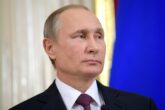February 20, 2018
At the Munich Security Conference, the United States Lacked Bravery and Leadership
“I’m counting on you to be brave.” That was U.S. Sen. John McCain’s message to the hundreds of participants at this month’s Munich Security Conference. The Arizona Republican, who is undergoing treatment for brain cancer, wasn’t able to lead the congressional delegation to Munich as he’s done for decades. Instead, he sent a message with his wife, Cindy, who was there to accept the Ewald von Kleist Award in his absence. The senator didn’t need to be there, though, to get across an important and pertinent message. Having witnessed many times the power of the Atlantic alliance when Europe and the United States led together, McCain has been a strong advocate of the trans-Atlantic relationship for as long as anyone can remember. But as he’s noted in various speeches in recent months, he’s worried that something is amiss in the relationship, that the two sides are failing to rise to meet today’s challenges, and that nothing less than the future of the West hangs in the balance. He therefore asked those in attendance to be brave.
Unfortunately, “brave” wasn’t the word that came to mind during the dozens of other speeches in Munich this year. Nor was the word “bold.” If you came to Munich looking for a call to action, you left empty-handed. French President Emmanuel Macron, the sole European leader who has tried to offer anything resembling a vision for the future of Europe, chose not to come to Munich. German Chancellor Angela Merkel, still working to form a new government, didn’t come either. That left British Prime Minister Theresa May. But she delivered a wonky speech on Britain’s future security relationship with the European Union after Brexit. While those of us who make a living out of studying things like the European Defense Fund enjoyed it, many others felt she missed the chance (again) to sketch out a bigger vision for the future of the West and the rules-based order.
Read the full op-ed in Foreign Policy
More from CNAS
-
The Eurasian Century: Hot Wars, Cold Wars, and the Making of the Modern World with Hal Brands
For more than 100 years, the continent of Eurasia has played a central role in global geopolitics. In the 20th century, numerous authoritarian powers from Germany under Kaiser...
By Andrea Kendall-Taylor, Jim Townsend & Hal Brands
-
Trump Wants a Nuclear Deal. Can He Be the Ultimate Negotiator?
Should Trump negotiate with Russia’s Putin, and what terms should he pursue if US and global security is to be enhanced?...
By Jon B. Wolfsthal
-
Trump Turning Washington Crash into ‘Bar Room Talk’ Will Turn People Away | Jim Townsend
Trump's unchecked claims that the DC crash was caused by diversity quotas should "turn people away" from him, says Jim Townsend, an adjunct senior fellow in the CNAS Transatla...
By Jim Townsend
-
Putin’s Fight Won’t End With Ukraine
In an essay for Foreign Affairs, titled “Putin’s Point of No Return,” Andrea Kendall-Taylor, senior fellow and director of the Transatlantic Security Program at the Center for...
By Andrea Kendall-Taylor




